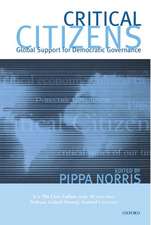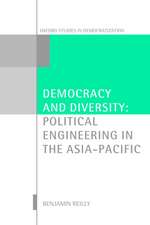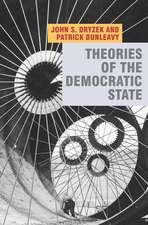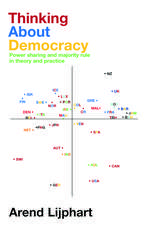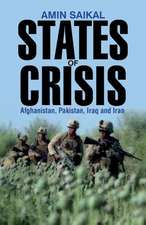Democracy and Reform in the Middle East and Asia: Social Protest and Authoritarian Rule After the Arab Spring
Editat de Amin Saikal, Amitav Acharyaen Limba Engleză Hardback – 22 dec 2013
Preț: 714.70 lei
Preț vechi: 1027.77 lei
-30% Nou
Puncte Express: 1072
Preț estimativ în valută:
136.75€ • 142.78$ • 113.18£
136.75€ • 142.78$ • 113.18£
Carte tipărită la comandă
Livrare economică 05-19 aprilie
Preluare comenzi: 021 569.72.76
Specificații
ISBN-13: 9781780768069
ISBN-10: 1780768060
Pagini: 280
Ilustrații: black & white tables
Dimensiuni: 138 x 216 x 30 mm
Greutate: 0.49 kg
Editura: Bloomsbury Publishing
Colecția I.B.Tauris
Locul publicării:London, United Kingdom
ISBN-10: 1780768060
Pagini: 280
Ilustrații: black & white tables
Dimensiuni: 138 x 216 x 30 mm
Greutate: 0.49 kg
Editura: Bloomsbury Publishing
Colecția I.B.Tauris
Locul publicării:London, United Kingdom
Notă biografică
Amin Saikal is Director of the Centre for Arab and Islamic Studies and Professor of Political Science at the Australian National University. He has been a visiting fellow at the University of Cambridge and Princeton University, as well as at Sussex University's Institute of Development Studies. He has also been a Rockefeller Foundation Fellow in International Relations. He is the author of a number of works on the Middle East, Central Asia and Russia, including "Islam and the West: Conflict or Cooperation?" (2003); "The Rise and Fall of the Shah: Iran from Autocracy to Religious Rule" (2009), "Modern Afghanistan: A History of Struggle and Survival" (I.B.Tauris, revised 2012) and" States of Crisis: Afghanistan, Pakistan, Iraq and Iran" (I.B.Tauris, forthcoming). Amitav Acharya is Professor in the School of International Service, American University, Washington, D.C., USA, having previously held Professorships at the University of Bristol and York University, Toronto. His recent books include "Whose Ideas Matter?" (2009); "Beyond Iraq: The Future of World Order "(co-edited, 2011); "Non-Western International Relations Theory "(co-edited, 2010); and "The Making of Southeast Asia" (2011).
Cuprins
Introduction: Democratizing the Neighborhood: The Implications of the 'Arab Spring' for the Middle East and Asia. Amin Saikal and Amitav AcharyaChapter 1: Where have all the Democratic Expectations Gone? Tunisia and Egypt in Comparative Perspective. Mohammad SelimChapter 2: Managed Reforms and Deferred Democratic Rule in Morocco and Algeria. Karima LaachirChapter 3: Humanitarianism, Democracy and Intervention: Libya and the Responsibility to Protect. Ramesh ThakurChapter 4: Afghanistan and Iraq Between Democracy and Radical Islam. Amin SaikalChapter 5: The Arab Revolution is Bad News for Iran. Shahram AkbarzadehChapter 6: Central Asia and the Arab Spring: Discourses of Relevance and Threat in the Region. Kirill NourzhanovChapter 7: Pakistan and the Arab Uprisings. Samina YasmeenChapter 8: China's Responses to the Arab Uprisings. Baogang HeChapter 9: Democratization in Myanmar and the Arab Uprisings. Trevor WilsonChapter 10: Arab Uprisings' Contagion: Electronic Vicariousness and Democratic Empathy in Malaysia and Singapore. Alan ChongChapter 11: 'Look Over Here!': Indonesian Responses to the 'Arab Spring'. Greg Fealy

